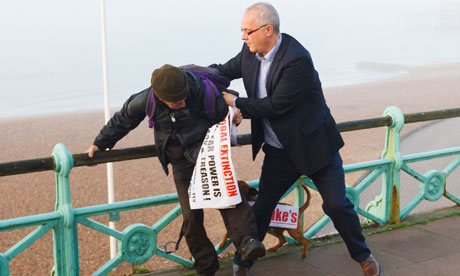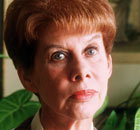A televised scuffle on the Brighton seafront made a laughing-stock of editor Iain Dale this week - but that's nothing compared with the humiliation of the publishers who turned down Harry Potter

Publishing biteback … Iain Dale. Photograph: Chris Ison/PA
Iain Dale's scuffle this week at Brighton, as the burly head of Biteback wrestled with a small elderly protester while his author Damian McBride was being interviewed for breakfast TV, led to what was probably the most public humiliation ever undergone by a publisher: the clip went viral, TV news channels and newspapers gleefully showed the images, and comments (in the press and on Dale's blog) were largely hostile. It deserves a place in a top 10 of publishers' worst experiences, which otherwise mercifully took place away from the public eye...
1933: Thomas Wolfe submits a lengthy manuscript to Max Perkins at Scribner's. Having made Wolfe's Look Homeward, Angel a hit by cutting out 90,000 words, Perkins (played by Colin Firth in the forthcoming film Genius) buckles down, groaning, and turns it into the still-vast but single volume Of Time and the River. Yet Wolfe stuns him again by leaving Scribner's.
1960: Mrs Max Schuster, a discriminating reader, peruses Harold Robbins's raunchy novel The Carpetbaggers and asks Max: "Is this the kind of dreck you want to publish at Simon & Schuster?" Afraid of her scorn, he lets the book (total sales more than 8m copies) and Robbins (best-selling writer of the 1960s and 70s) go elsewhere.
1972: Reclusive tycoon Howard Hughes gives a press conference by phone to denounce Clifford Irving's fake Hughes autobiography. Panic at McGraw Hill, which had paid $765,000 to Irving, most of it intended for Hughes but channelled back to Irving via a dodgy Swiss bank account.
1980. Buccaneering Roger Straus and bookish Robert Giroux, the odd couple who had made Farrar, Straus and Giroux America's most illustrious literary publisher, fall out over what Giroux says about Straus in his introduction to an anthology marking his 25 years at FSG. Their relationship never recovers from the tiff and the firm's heyday is over.
 1984: Anita Brookner's glum hymn to spinsterhood Hotel du Lac is the shock winner of the Booker prize, leaving the publishers of the rival favourites, JG Ballard's Empire of the Sun (Gollancz) and Julian Barnes's Flaubert's Parrot (Cape), open-mouthed at the prizegiving banquet.
1984: Anita Brookner's glum hymn to spinsterhood Hotel du Lac is the shock winner of the Booker prize, leaving the publishers of the rival favourites, JG Ballard's Empire of the Sun (Gollancz) and Julian Barnes's Flaubert's Parrot (Cape), open-mouthed at the prizegiving banquet.
More
1933: Thomas Wolfe submits a lengthy manuscript to Max Perkins at Scribner's. Having made Wolfe's Look Homeward, Angel a hit by cutting out 90,000 words, Perkins (played by Colin Firth in the forthcoming film Genius) buckles down, groaning, and turns it into the still-vast but single volume Of Time and the River. Yet Wolfe stuns him again by leaving Scribner's.
1960: Mrs Max Schuster, a discriminating reader, peruses Harold Robbins's raunchy novel The Carpetbaggers and asks Max: "Is this the kind of dreck you want to publish at Simon & Schuster?" Afraid of her scorn, he lets the book (total sales more than 8m copies) and Robbins (best-selling writer of the 1960s and 70s) go elsewhere.
1972: Reclusive tycoon Howard Hughes gives a press conference by phone to denounce Clifford Irving's fake Hughes autobiography. Panic at McGraw Hill, which had paid $765,000 to Irving, most of it intended for Hughes but channelled back to Irving via a dodgy Swiss bank account.
1980. Buccaneering Roger Straus and bookish Robert Giroux, the odd couple who had made Farrar, Straus and Giroux America's most illustrious literary publisher, fall out over what Giroux says about Straus in his introduction to an anthology marking his 25 years at FSG. Their relationship never recovers from the tiff and the firm's heyday is over.
 1984: Anita Brookner's glum hymn to spinsterhood Hotel du Lac is the shock winner of the Booker prize, leaving the publishers of the rival favourites, JG Ballard's Empire of the Sun (Gollancz) and Julian Barnes's Flaubert's Parrot (Cape), open-mouthed at the prizegiving banquet.
1984: Anita Brookner's glum hymn to spinsterhood Hotel du Lac is the shock winner of the Booker prize, leaving the publishers of the rival favourites, JG Ballard's Empire of the Sun (Gollancz) and Julian Barnes's Flaubert's Parrot (Cape), open-mouthed at the prizegiving banquet.More
No comments:
Post a Comment